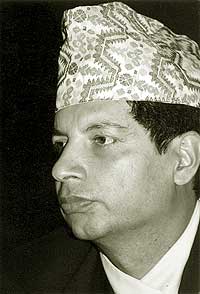Shanker Sharma has been through a roller-coaster ride in his five years at the National Planning Commission, but nothing has prepared him for the present challenge of cashing in on the peace dividend. Five months after his appointment as vice-chairman by the Chand government, he spoke to Nepali Times about the impact of the Iraq war on the Nepali economy, poverty alleviation and reconstruction.
 Nepali Times: How will the Iraq war impact the Nepali economy?
Nepali Times: How will the Iraq war impact the Nepali economy?
Shanker Sharma: It will depend on the duration and intensity of the war. In fact, the world has anticipated this for quite sometime, and the market has responded accordingly. Fortunately, there haven't been any disruptions in the supply of petroleum products so far. If the war drags on, it will have a negative impact on Nepal's foreign trade and tourism. One of the areas affected most by the war is the petroleum sector. With the imports bill going up, it could adversely impact the balance of payments situation. The Indian government revised the price of petroleum products nearly ten times in the last six months. We had to hike the price because the government has been absorbing all the difference. We know this will affect transportation costs, inflation and cost of production.
That means it will affect economic growth.
Worldwide economic growth is estimated to decline by 10 percent. There were some signs of tourism reviving this season, but the Iraq war was a backlash and remittances too will suffer temporarily. Nepali exports could also be affected, reflecting trouble in our export destinations. All of this affects the GDP, which puts pressure on the government's budget, development expenditure and creates a negative impact on economic growth.
This will hit development, too. What advice are you giving the government?
The development funds could not be spent at the district level due to insecurity. There was very little demand for central grants among the Village Development Committees and District Development Committees. Now the government has formed a committee headed by the Local Development Officer at the district level. This will place responsibility of works related to roads, drinking water, irrigation, rural electrification and rural infrastructure with community-based organisations and users groups.
Can you make any economic forecasts for the year?
It is still early to make any forecast. We have to deal with the fallout of the Iraq war with four months to go before the end of this fiscal year. Of course, it will be much better than last year (when the growth rate was negative) but we will not be able to achieve the growth rate of 5 or 6 percent we projected earlier.
How about reconstruction and rehabilitation in areas directly affected by the Maoist insurgency?
Essential services like electricity have already resumed. We have asked donors to continue activities in their sectors. The Peace and Development Trust is working towards rehabilitating the people displaced by the insurgency. NGOs and INGOs are also actively involved. The needs of local communities are being assessed. We need to launch immediate humanitarian as well as long-term income generating activities. The Trust is working to establish food-for-work and school-feeding programs. Our aim is to bring the peace dividend to the people. Within three to four months you will see development works expedited.
How much is all this going to cost us?
We estimate the destruction of infrastructure at around $250 million. That figure doesn't take into account the impact on the economic growth. We need Rs 2.5 billion immediately to reconstruct the infrastructure in priority areas. The costs for reconstruction in the second phase have yet to be estimated. The government has already allocated a budget for district headquarters at Achham, Jumla and Arghakhanchi. The first phase of reconstruction activities are already speeding along in these places.
Do you have a timeframe in mind?
Basically, the course of the peace process as well as the availability of funding will determine it. As soon as the situation is favourable, we will also work on strategies for nation building.
How does the government plan to rehabilitate people displaced by the insurgency and find them local employment?
People who left the country, especially for India, have started returning home. The local administration and NGOs are supporting those who took refuge at various district headquarters. Large-scale rehabilitation will depend on the outcome of the peace talks. The government is going to sanction labour-intensive, income-generating programs at the district level.
How will the Tenth Plan address the need for reconstruction?
We have made two different projections for the Tenth Plan. Our focus has been on poverty alleviation and we have already incorporated issues like re-orienting development programs towards this end. Except the humanitarian and other immediate needs, our long-term programs fit exactly into the framework of the Tenth Plan.
You were appointed a member of the NPC five years ago. How do you see your new role as its vice chairman?
Though it is a collective responsibility, accountability increases when you are in a leadership position. We have already finalised the Tenth Plan and are now working a summary. The first-phase of the Mid-Term Expenditure Framework (MTEF) is complete, and we have also finalised the Poverty Reduction Strategy Paper (PRSP). The high-level committee for monitoring development programs met after a gap of nearly 20 months recently under the chairmanship of the prime minister. Some people, including the donor community, find it hard to believe that the NPC has completed all this. We are preparing a preliminary report for poverty monitoring within this fiscal year. The NPC is working to coordinate reconstruction, rehabilitation and relief works. Although we have a heavy workload, I am satisfied with the NPC's performance.


